Byzantine Games: the story of the confrontation of Berezovsky and Primakov
When the smoke cleared over the places of the past battles for power and property, it became clear that one of the main reasons for the changes was the desire of the Soviet party economic and political system to transfer “tie” state ownership into personal, concrete property. It was the struggle for the “cashing in” of public property between various clans that determined the main character of political, economic and social transformations in Russian society of the nineties. Against such a background, one of the many collisions of that time happened - Evgeny Primakov and Boris Berezovsky. The confrontation of these different-sized figures is interesting for two reasons. On the one hand, this is a Soviet struggle by birth, upbringing and the career of "fathers and children". On the other hand, the final clash in the outgoing Yeltsin era (in any case, it was widely publicized in the press).
The wars of the nineties were, as it should be, wars, heavy, protracted, violent and ... intraspecific. The “Fathers” (party nomenclature), employed after 1991, were delicious and open sharing of state property (it was then that the giant state monopolies Gazprom, Chernomyrdin and Vyakhirev, Rosneft Putilova, Russian Railways Yakunin, RAO UES of Chubais and others) unexpectedly faced with the "children", which they also gave birth, namely, the oligarchs of post-Soviet coinage. And if the first, by virtue of their upbringing, traditions and stereotypes, separated the existence of the interests of the state and society from their own, then the children raised by them their own interests, no, they did not even put it higher, they sincerely considered them the interests of the state and society. And their main passion was a fierce, unrestrained, almost manic thirst for profit. Let's take a closer look at the opponents who have come together in an implacable battle at the end of the nineties.
Heavyweight Evgeny Maksimovich Primakov was a typical representative of the Soviet party nomenclature. A very closed person who simply does not tolerate publicity, is practically impenetrable to the omnipresent press. Vitaly Tretyakov, the editor-in-chief of Nezavisimaya Gazeta, anticipated the interview with Primakov with the following remark: “It’s impossible to extricate something extra from it, especially for a dictaphone recording.” Obviously, at the basis of such secrecy lay a general fear embedded in the souls of Soviet people during the years of Stalinist repression. And when, with Soviet posters, a woman with a finger at her lips called “Don't chat!”, Then it was clear to every person that any, even the closest person, could be an eavesdropper. The ability to remain silent and not be revealed was a prerequisite for everyone who aspired to make a career in such a society.
The very fact of the birth of Yevgeny Primakov is surrounded by secrets and rumors. All that is known is that he was born on October 29 on October 1929 in Kiev. As one of the characters of the unforgettable Arkady Raikin used to say: "It was a nasty time." The peak of collectivization, the lull before the onset of the Bolshevik-organized famine, which began in the 1930 year and lasted until the 1935. The time of the first five-year plan, when the country's industry was re-created at the expense of plunder of the peasant masses. Zhenya Primakov was born at such a time. The reasons that forced his mother, Anna Yakovlevna Kirshenblat, a doctor by profession, are unclear for certain, literally a few days after the birth of her son, leave for Tbilisi (then Tiflis), where she worked until her death in the 1972 year at the spinning mill polyclinic. Nothing is known about Primakov’s father, the son in his autobiography wrote in the spirit of the best Byzantine-Soviet traditions only a short phrase: “Father died when I was three months old.” Willingly, the words of another character from the political landscape of the nineties, Vladimir Zhirinovsky, come to mind: "My mother is Russian, and my father is a lawyer."
In 1944, Primakov was enrolled in the Baku Naval School, and in 1946, Yevgeny was expelled from him for health reasons. It is clear that there is no information about what happened to the seventeen-year-old boy. He returned to Tbilisi in two years, in 1948, to enter the Moscow Institute of Oriental Studies at the Department of Arabic Studies. After graduation, Primakov was accepted into the graduate school of the economics department of Moscow State University, which was a rare success for a provincial without ties. He graduated from the graduate school in 1956. And luck again.
Primakov was hired by the editor of the Middle East broadcasting as a radio correspondent. This is not only a prestigious and highly paid position, but also the ultimate dream of many Soviet people - regular trips abroad. On radio, Primakov worked for nine years, joined the CPSU and rose to the position of head of the broadcasting department in the countries of the Arab East. Apparently, at about the same time (this is still a mystery covered in darkness), his cooperation with KGB intelligence begins.
In parallel with the work, Primakov arranged his personal life. He married Tbilisi-born Laura Kharadze (in the 1951 year), who bore him a son, Alexander, and a daughter, Nana. Also, Evgeny Maksimovich became his in a narrow circle of influential international affairs reporters. In 1962, he moved to the central organ of the Soviet press, Pravda, where he was accepted as an international columnist for the Middle East. It was after this point that a part of his messages began to go off to the press, and to the Central Committee, the Foreign Ministry, the KGB under the heading "Secret." Such cooperation was the elevator that lifted Primakov to career heights. In the 1970 year, he was appointed deputy director of the Institute of World Economy and International Relations (IMEMO), and this is not just the nomenclature, but the nomenclature of the Central Committee! The institute was engaged in the development of the foreign economic policy of the Party Committee; Brezhnev’s reports on international economics were written there, that is, responsible and important work was done for the highest party body. At the same time, Primakov got acquainted with Alexander Yakovlev, the “architect” of perestroika, at that time the head of the ideological department of the Central Committee, who subsequently contributed a lot to the rise of Yevgeny Maksimovich.
In 1977, Primakov headed the Institute of Oriental Studies, and in 1979, he was elected a full member of the Academy of Sciences in Economics. And although his works in this area (except for graduate students) are unknown, he received his academic life annuity. Under Andropov, Yakovlev, then director of the IMEMO, took Primakov to himself, and after leaving the Central Committee for Gorbachev, he left at the head post (in the 1985 year). By 1989, the sixty-year-old Primakov was already at the very top. He was elected a candidate member of the Politburo and Chairman of the Council of the Union of the Supreme Soviet of the USSR. In this difficult and crucial time for the rulers of the country, Yevgeny Maksimovich demonstrated brilliant abilities to adapt to any regime. Opponents of Primakov accused him of failing missions in Baku in the 1990 year and during Iraq’s attack on Kuwait. Disoriented after returning from Foros, Gorbachev, frantically trying to strengthen his position, appointed 30 of September 1991 of the year to Yevgeny Maksimovich head of the First Directorate of the KGB. Later he also took the position of head of the Foreign Intelligence Service. Yeltsin, who replaced Mikhail Sergeyevich, left Primakov in such an important post.
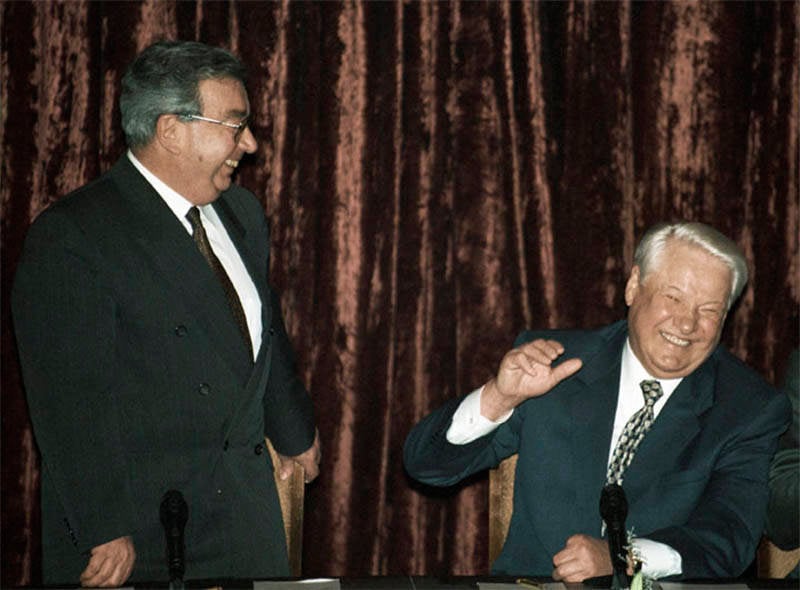
In the 1996 year, Yeltsin relocated Evgeny Maksimovich to the post of foreign minister instead of Kozyrev. Primakov did not succeed in this sphere well-known to him. He did not succeed in persuading Milosevic to stop the war with the former Yugoslav republics and thereby prevent the bombing of Yugoslavia degrading for Russia. And the famous reversal over the Atlantic, when he did not fly to the negotiations in the United States as the head of the government, remained just an empty gesture. He also failed to prevent the entry of the former countries of the socialist camp into NATO. Russia by that time was rapidly losing its influence in the Middle East. Of course, Evgeny Maksimovich was unable to resist the general collapse alone.
The words “we do for ourselves”, perhaps, can be considered the creed, the motto and principle of the new generation of the Soviet elite, who grew up under the shadow of the party nomenclature. Thoroughbred offspring of the nineties Boris Abramovich Berezovsky was born on January 23 of 1946 in Moscow in a typical family of Soviet intellectuals. Father - Abram Markovich - a civil engineer from Tomsk, mother - senior laboratory assistant at the Institute of Pediatrics, Academy of Medical Sciences of the USSR. Able young man, a member of the Komsomol, and subsequently the CPSU, graduated in 1967-th year, the Faculty of Electronics and Computer Engineering of the Moscow Forestry Institute. In 1973, he managed to get another higher education - after studying at the most difficult mechanics and mathematics department of Moscow State University. Later, Berezovsky defended his PhD at the Institute of Management Problems and began to move quickly along the scientific steps. Engineer, Junior Researcher, Senior Researcher, Head of Department, Laboratory of the Institute of Management Problems, USSR Academy of Sciences. In the 1983 year, he became a doctor of technical sciences, and from the year 1991 - Corresponding Member of the Russian Academy of Sciences in the sections of mathematics, mechanics and computer science. He is the author of more than one hundred scientific papers and several monographs that have been translated into English, German, French and Japanese.
Berezovsky, as soon as the opportunities opened by perestroika appeared, succeeded in pursuing money after a completely successful career of a Soviet scientist. However, not just for the money, but for very large money. In which he succeeded. We will not repeat all the stages of his “big way”, they are well known. Berezovsky made excellent use of the circumstances suggested by the story. In the chaos of reform, he, like the rest of the future oligarchs, played the role of a bluebird beater. And in such a role did not disdain anything: deception and theft (LogoVAZ, AVVA), forgery (United Bank, ORT), hakok (Sibneft, Aeroflot, Kommersant, Novye Izvestia, Ogonyok) and so on and so forth. But having become the owner of big money, Berezovsky wanted no less great power, including political. In addition, he was well aware that without covering up his capital, he could have serious problems.
The foundation of political influence of Boris Abramovich in the nineties was the control of the media and, above all, the First Channel. Berezovsky also controlled the Novye Izvestia newspaper created by the former Izvestia editorial team. He tried himself in various government positions: deputy secretary of the security council, executive secretary of the CIS, deputy of the State Duma. But his most important political role was the active support of Yeltsin's election campaign. By the time of the battle with the "heavyweight" Primakov, Berezovsky approached being a proven "friend-wallet" of the "Family." It doesn’t matter that Boris Nikolayevich himself and his relatives barely endured, or rather, had to endure for the successful “Voice of Heart” operation on Yeltsin’s re-election as President of Russia in 1996.
After the default of 1998, an economic and political crisis erupted. The president urgently needed a break, so the weakening, fluttering Yeltsin put Primakov at the head of the government. The new cabinet coped with its task quite successfully - the crisis was over, the deputies (for the first time in recent years) developed a surplus budget. However, the more successfully Primakov worked, the more irritated he was in the Kremlin. Berezovsky immediately felt the danger of a new situation. Political power from the hands of the Kremlin for a short time passed to Primakov and the “red” Duma, for whom the motto “capitalism was for its own people” was unacceptable. Already a couple of months after Yevgeny Maksimovich began work in the new position, the oligarchic mass media were digging into the anti-crisis government with might and main. Accusations were made of supporting the Communists, using Soviet methods of leadership, strengthening the special services, and even preparing a "palace coup".
For Primakov, from the very beginning, the main enemy was not Berezovsky at all, but the system of “seven bankers”, formed as a result of building capitalism in Russia. At the beginning of February, 1999, right at the government meeting, announced the start of the fight against corruption. Yevgeny Maksimovich said that ninety thousand criminals will receive amnesty, and ninety thousand economic criminals will be put on the vacant seats. He began the fight against the oligarchs with the help of the Prosecutor General's Office. His letter (by the way, completely illegal, but who ever stopped before in our power?) Ordered the then Prosecutor General Skuratov to start an investigation against the oligarchs and their companies. At this emotional step, Berezovsky responded, according to eyewitnesses, with the phrase: “They did not shoot such people!”. To which the answer, according to rumors, sounded: “Fine. Either he or I.
The fight began. According to ORT, they showed a famous video with a man “very similar to the Prosecutor General of Russia” in the company of two prostitutes. The press published materials that sharply criticized the key figures of the Primakov government: the vice-premier Maslyukov and Kulik and the Minister of Finance Zadornov. Prime Minister Sergey Dorenko figuratively and vividly proved to all the destructiveness of the way in which the Prime Minister was going to lead the country. Berezovsky’s calculation was simple, if Yeltsin would remove these people from the government, Primakov would be forced to resign.
However, the government and the Duma still had an advantage. Throughout the autumn, prosecutorial checks of Berezovsky’s empire and his retinues took place. Yeltsin's son-in-law Valery Okulov dismissed nine top managers of Aeroflot, appointees of Berezovsky. ORT lost state subsidies. The main "distributor" of advertising on the channel Sergey Lisovsky fell under the rink of the tax police. The Samara Interior Ministry was actively investigating the criminal activity at AvtoVAZ. At the same time, the Prosecutor General’s Office began the criminal prosecution of the head of the third largest bank in Russia, SBS-Agro (there were accounts of the President’s Office in this bank) Alexander Smolensky and part-time “Berezovsky’s man”. At the offices of "FOK", "Atoll", "Sibneft" were searched. At the request of Primakov, Dorenko was removed from the air. The Executive Secretary himself came under attack, the Prosecutor General’s Office accused him of embezzlement and of involvement in the murder of Anatoly Bykov, the main actor in the deal with Berezovsky and Abramovich for the sale of shares of the Krasnoyarsk Aluminum Plant. At the same time (in the autumn of 1998), a joint investigation was opened with the FBI by the Ministry of Finance and the US Department of Justice over the $ 7 billion exported from banking institutions close to Berezovsky and Abramovich. And at the beginning of the summer of 1999, the Swiss prosecutor’s office began investigating the activities of the firms Andava, Forus and some others, one way or another connected with the name of Boris Abramovich. The accounts of Berezovsky and Nikolai Glushkov, his Aeroflot partner, as well as other defendants who were directly related to the activities of these companies, were arrested. Moreover, Berezovsky was denied an entry Swiss visa. Boris Abramovich was beside himself with anger, he portrayed equanimity and stoicism, but from the outside it looked rather pathetic. The essence of his statements was reduced to only one thing - a new era of repression is coming in the country.
2 April of the same year, Yeltsin removed his former partner from the post of executive secretary of the CIS. 3 March in the office of the Russian ambassador to Azerbaijan, Boris Abramovich, found out that he had been removed from his post by Yeltsin’s decree with the murderous wording: “For not fulfilling the instructions of the chairman of the CIS Council of Heads of State and systematic actions that go beyond the executive secretary’s powers”. In such circumstances, most people would fall into depression, start tossing and grabbing a glass. Berezovsky, in response, just burst out laughing to tears.
And on April 6, since Glushkov and Berezovsky did not appear to testify in the Aeroflot case, the Prosecutor General’s Office issued warrants for their arrest and sent them to Interpol. Boris Abramovich was forced to hastily seek refuge in blessed France. The situation seemed to be hopeless. But the genius of the active combinator Berezovsky flourished in such situations. Cornered, he was in his element.
Berezovsky immediately gave an interview to the English Sanday Telegraph. In it, he categorically denied all the accusations, explaining that with political intrigues of his opponents (Primakov in particular), and also stated that he intended to seek justice in his homeland. In addition, in his subsequent Parisian interviews he said: “The president loses power, and the opposition gains it. Yeltsin and Primakov are completely different people. I have no complaints about Boris Nikolayevich, although I admit his mistakes (Chechen company), I always support him. With the advent of Primakov, the situation in the country broke ... He is more dangerous than the Communists, who are trying to return the irrevocable. His main strength is in the special services, and more precisely in the worst of them. Primakov heads the remnants of special services fighting against reforms. I have experienced the pressure of this system. And I do not fear him, although I know what he is capable of. ” The most serious and dangerous, from the point of view of Berezovsky himself, the event took place in November of 1998, when Primakov and Luzhkov created Fatherland. It was already a serious bid for power over the whole country.
In defense of Berezovsky, Sergey Stepashin, an old and devoted associate of President Yeltsin, spoke at the time, preparing to take up the post of Minister of Internal Affairs of the Russian Federation and, at the same time, the post of first deputy chairman of the Government, that is, Primakov. Stepashin said that Berezovsky could avoid arrest only if he testified. Obviously, without the knowledge of the "Family", this Russian official would not have dared to take such an unprecedented step.
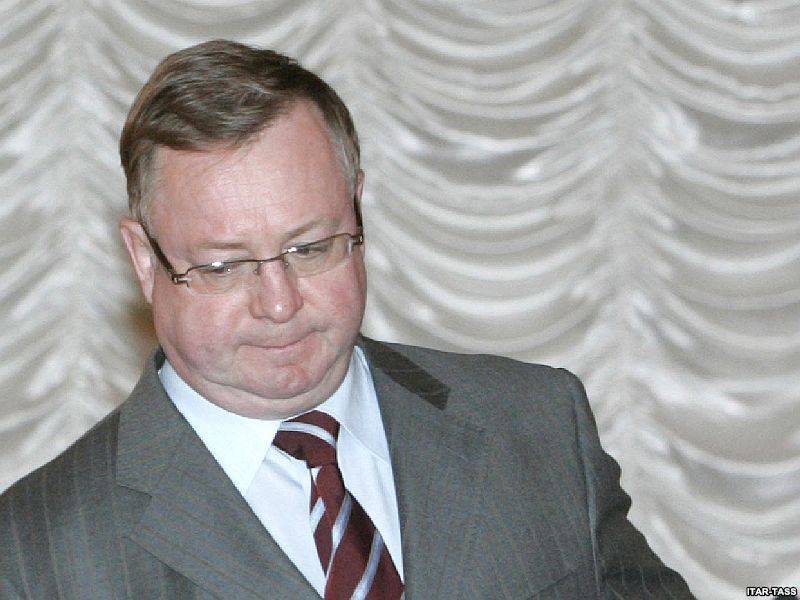
Indeed, Berezovsky, who correctly evaluated the signal sent to him - the guarantee of immunity - April 18 returned to Russia. Berezovsky understood that Yeltsin could not long tolerate the strengthening of the positions of Primakov, who had escaped his control. He will not allow him to unwind dangerous corruption cases for the president himself. Even at the airport, he said that Primakov’s reforms were extremely dangerous for Russia. 26 April he met with the investigators. After the interrogation, Boris Abramovich stated that he had not found a single statement in the investigation documents that corresponded to reality. The General Prosecutor’s Office recalled the arrest warrant. Berezovsky publicly pointed his finger at those who stood behind his persecutions, calling the name of Primakov and some former KGB officers. On the same day, there was a direct confrontation of the main participants in the cover-up bout. The Russian Prime Minister, who himself initiated this meeting, according to some information, received the Russian oligarch in his office.
What exactly the two representatives of the nomenklatura generations of "fathers" and "children" said, unfortunately, is unknown. In an interview with Echo of Moscow, Berezovsky argued that no agreement had been reached. Some analysts announced that the old guard, represented by Primakov, had collapsed before the pressure of the new generation of Russian destinies who had come to replace it.
Forces of the prime minister to fight with the Russian oligarchs, plundering Russia in his understanding, and with the president, who had occupied the Kremlin “Family”, were not enough. The administration of Yeltsin was stronger than Yevgeny Maksimovich and the mayor of Moscow and the State Duma who supported him. 27 April 1999 of the year Boris Yeltsin dismissed Deputy Prime Minister Vadim Gustov and appointed Stepashin to the vacant seat. Yevgeny Maksimovich “swallowed” the first resignation of his government in silence. And on May 12, even Primakov himself lost his post, Sergey Stepashin was appointed prime minister. Berezovsky was triumphant, in his words: "The resignation of Primakov was the collapse of attempts at communist revenge." Boris Abramovich could again move the figures on the Kremlin playground. The new first deputy chairman of the Government was his protégé and Abramovich - Nikolai Aksenenko, Viktor Kalyuzhny, the “man” of Berezovsky, was appointed minister of fuel and energy. It was these two who provided Sibneft, which belonged to Berezovsky and Abramovich, with lucrative contracts for the export of products. Vladimir Rushaylo was appointed Minister of the Interior, who worked closely with Berezovsky in Chechnya. And the presidential administration was headed by Alexander Voloshin, who once helped Berezovsky to launch the investment scam "AVVA".
Still, the loss of Yevgeny Maksimovich did not become a victory for Berezovsky. The great combinator did not consider one. By that time, a change of generations had already passed in the party's nomenclature, and no less skilled and ambitious players were taking the lead. Ill Yeltsin and his entourage frantically sought out a replacement for the "Boss." Too soft, according to the "Family", Stepashin was not fit in the "Successors". We needed a man steeper dough. And soon, as we know, such a person was found. The irony of fate was that Boris Abramovich himself had a hand in the matter of his exaltation. Yeltsin was replaced by the promoted pioneer Vladimir Putin, soon equipping the old guard in warm, but meaningless offices, and oligarchs, placing him under the control of the administrative-power system, called the vertical of power.
The paths of Berezovsky and Primakov no longer intersect. Boris Abramovich from 2000-th year was in exile in England. 23 March 2013 year he was found dead in his own bathroom. In recent years, Berezovsky has constantly criticized the political course of Russia, calling his dismissal of Vladimir Putin his main goal. Primakov also left the political arena. Along with his departure, the independence of the State Duma, which became a rubber stamp on projects prepared in the Kremlin by state laws, also disappeared. The fear of Evgeny Maksimovich himself, who fully supported all the undertakings of the new management, also disappeared. In response, he was cared for by the President, receiving ranks, privileges and honorary positions. Here is an excerpt from the speech of Primakov during the election campaign of 2011 year: “Putin’s image is the image of Russia. I hope he will be president. He is the optimal figure for this ... ".
Information sources:
http://imrussia.org/ru/society/347-qprimakovs-listq-and-berezovskys-apartment
http://www.kurginyan.ru/publ.shtml?cmd=sch&cat=628&vip=13
http://1prime.ru/Politics/20130324/762037329-print.html
http://www.compromat.ru/page_9249.htm
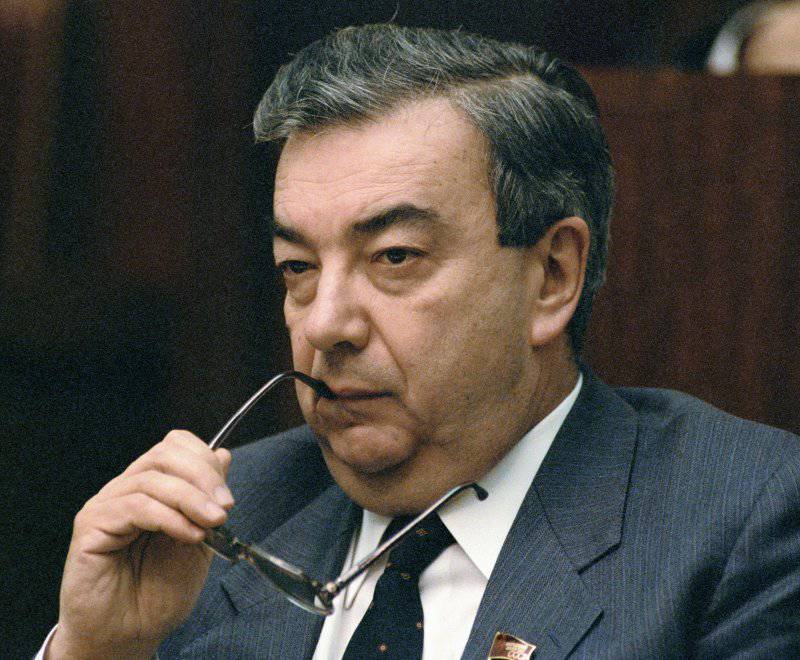
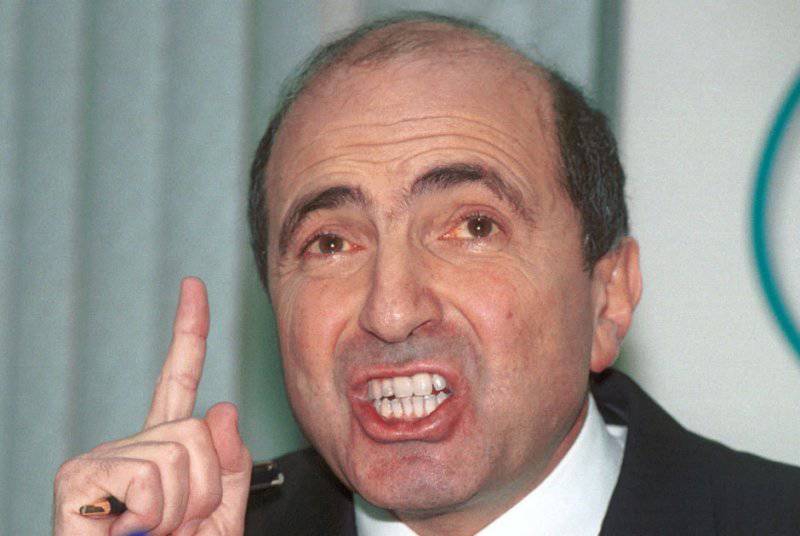
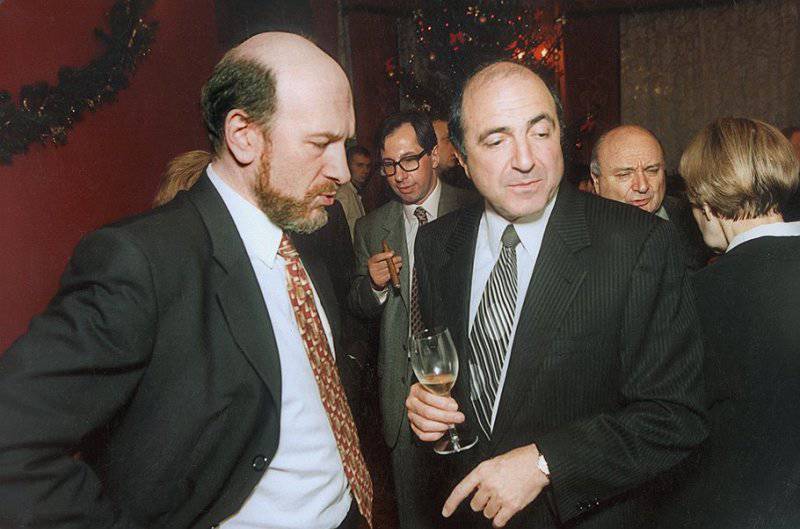
Information